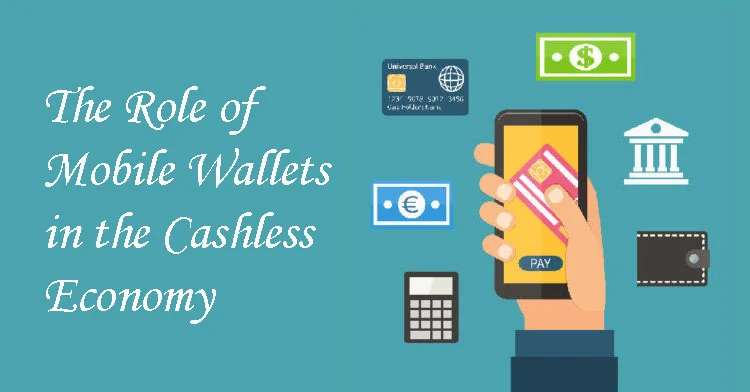The Role of Mobile Wallets in the Cashless Economy :- Our society is rushing in a rapid digital pace so the way we organize our finances and make payments is changing at such a pace. With the growing popularity of contactless payment means, mobile wallets are driving this financial transformation. The role of mobile wallets is also referred to as digital or e-wallets, and they have fundamentally changed the way we operate, maintain money matters, and make transactions. They have become critical parts of daily life. This section touches upon all aspects of mobile wallets, gives examples from the real world, and shows multiple perspectives to highlight the relevance of our topic: contactless payments.
The concept of “Cashless Economy” means the abolition of the conventional national exchange stream by digital platforms such as Internet banking, plastic card introductions, and online transactions. This alteration does not imply that the currency may not be used, but it may need the appropriate procedure to reduce the pace of the use of cash. Because digital transactions are becoming more frequent, the populace now has the opportunity to engage from various perspectives.
It is essential to get out of the cash world and enter a new world where cash is no longer accepted. As a result, the Indian government has established initiatives like Digital India to increase knowledge among the people about digital transactions and reduce the use of cash . In light of the size and scope of Cashless India efforts, the Indian government’s main concern is the horrifying problem of cybercrime and internet fraud, as well as public knowledge of the severe consequences. In this case, the bank is required because it is in charge of all operations, and since transactions are also tracked, banks will also do the monitoring.
Role of Mobile Wallet in Banking and Financial Services
Mobile wallets have brought digitalization to the way people do business and use their finances, as well as make payments in every aspect of their lives. They represent important aids in banking and financial services. In the face of new competition, changing customer demands, and the emergence of electronic payment instruments that take customers with mobile phones and other mobile devices, the traditional banking industry has no other option but to evolve. Digital payment methods are propositioning hassle-free, accessibility, and secured payment services. undefined.
Convenience at Your Fingertips:
With mobile wallets, users gain unprecedented levels of convenience. Thanks to the power and superiority of smartphones, people may carry their whole financial ecosystem around on a small gadget. Users can securely store their credit card, debit card, and loyalty card information using mobile applications such as Apple Pay, Google Pay, Samsung Pay, Phonepe, and other mobile wallets. The process is also convenient because users can simply tap and use their phone since most transactions involve only tapping, eliminating the need to bring cash or actual cards. A commuter can simply pay for a bus fare by tapping their phone on a contactless payment terminal, which means not having to look for the exact change or spending precious time.
Drives Financial Inclusion:
Digital payment through banking services is what makes financial get included faster in places, where the traditional banking services are not available. A tremendous number of the people who were unbanked have been aided by the blockchain technology with the ability to disperse, receive, and store funds.
Enhanced Security:
The fact that mobile wallets have been frequently used it has more to do with to security measures. Mobile wallets, as opposed to concrete physical cards, have advanced security features such as facial recognition, fingerprint construction and encryption technologists. Digital payments per se are inherently more secure due to these internal features which provide another cushion of protection against fraud or robbery. The fact that switching off all payment methods in a remote location, including through the loss or theft of a phone, is also prevented, plays a protective role. Users go for mobile wallets since they have a compelling apprise that these safety measures are a source of comfort.
Data-driven Insights:
It gives access to enormous volumes of transactional data which helps to know important things like what customers like, how they spend, and what they are doing. Financial institutions are in the position to come up with and market new products that take into consideration a deep understanding of the client’s needs, give spot discounts and use the data to offer personalized services.
Eco-Friendly and Cost-Effective:
A mobile wallet is leading to the way of a cleaner future. Mobile wallets have an ecologic advantage in that it help to limit the usage of plastics, especially credit cards, which often result in landfills. Moreover, firms can cut expenses on manufacturing and delivering plastic cards, a thing that eventually leads to savings capability for customers. Also, mobile wallets enable clients to keep track of the money spent in real time thereby giving them better chances to make good financial choices. People, who need exactly monitor their budgets, exactly might strongly appreciate this aspect due to its low price.
The Future of Loyalty Programs:
These days, the mobile wallet is an ideal location for loyalty and points systems. Rewards programs likeliness to acquire points, discounts or cashback incentives ensures the customer’s purchases through wallet as a result of the integration of the programs. The process of redeeming rewards can be made more convenient by using mobile wallet app that can serve as a master all-in-one app to flaunt multi-company loyalty cards on a single platform. The integration of this type of shopping makes it valuable as it not only drives brand loyalty but also repeat product purchase among consumers and businesses.
Conclusion:
The only certainty is that the role of mobile wallets has influenced the spread of a cashless economy. They are swiftly becoming a serious threat to regular transactions since they are simple to use, possess remarkable safety features, they are congruous with loyalty programs and they are gaining acceptance. To ensure that the payment experience is seamless and efficient, an appropriate hybrid approach should be chosen, which is a way of searching for a compromise between the advantages of mobile wallets and the convenience of traditional methods of payment.
Mobile wallets that are cheap, easy to use, and readily available have the potential to become the ultimate means in the toolbox of banks focusing on the unbanked population.
Frequently Asked Questions:
What is the scope of UPI for a cashless economy?
When by 2026 around 65% of all transactions will be through the Internet only, the expanding trend of using UPI and RuPay in rural India implies their importance in increasing the national economy and giving the farmers access to the financial services.
What are the major points that highlight the benefits of mobile wallets?
Easy and quick: With the mobile wallet when you pay for any transaction you don’t have to re-enter your credit card number, expiration date, CVV code and all. After you enter the necessary data it will be stored and with a click your payment will be executed.

